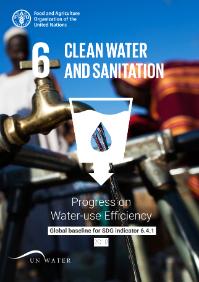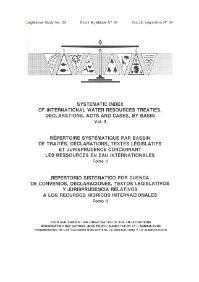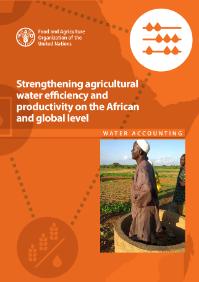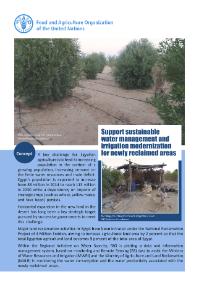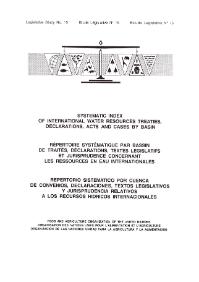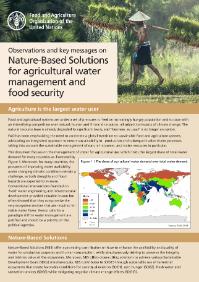Financing resource recovery and reuse in developing and emerging economies: enabling environment, financing sources and cost recovery
Resource recovery and reuse (RRR) of domestic and agro-industrial waste has the potential to contribute to a number of financial, socioeconomic and environmental benefits. However, despite these benefits and an increasing political will, there remain significant barriers to build the required up-front capital which is discouraging private sector engagement.
Nature-Based Solutions for agricultural water management and food security
Agriculture influences and shapes the world’s ecosystems, but not always in a positive way. More than 2.5 billion people are globally involved as stewards of land and water ecosystems that constitute the natural resource base for feeding the current and future world population. Yet, conventional agronomic interventions based on ‘hard’ agricultural engineering compromise various eco-services that are required for sustainable agricultural development.
Hydro-economic modelling for basin management of the Senegal River
Building on the economic/hydrological/hydraulic data collected on the field, a hydro-economic model of the Senegal River Basin was formulated and thus a water management plan for the optimal sharing of available resources was elaborated and illustrated in the present product.
Strengthening agricultural water efficiency and productivity on the African and global level
This brief constitutes part of the GCP/INT/231/SWI project “Strengthening Agricultural Water Efficiency and Productivity on the African and Global Level”, funded by the Swiss Agency for Development and Corporation (SDC). It is the fifth technical brief to illustrate (i) the project rationale; (ii) the pilot sites selected for implementation; (iii) the tools employed; (iv) the timeframe and the scaling up process; (v) the effective stakeholders and beneficiaries.
Progress on water use efficiency - Global baseline for SDG 6 Indicator 6.4.1
Access to safe water and sanitation and sound management of freshwater ecosystems are at the very core of sustainable development. This is the aim of Sustainable Development Goal 6 (SDG 6), which includes approaches to water management supported by international cooperation, capacity building and stakeholder participation.
Systematic index of international water resources treaties, declarations, acts and cases, by basin Vol. II
In 1978 the Food and Agriculture Organization of the United Nations (FAO) published a Systematic Index of International Water Resources Treaties, Declarations, Acts and Cases by Basin (Legislative Study No. 15). The Index covered some 2000 international legal instruments the earliest dating from the year 805 and the most recent 1977. It was designed to complement the specialized documentation produced by the United Nations system of organizations in the field of international water resources law.
Strengthening agricultural water efficiency and productivity on the African and global level
This brief constitutes part of the GCP/INT/231/SWI project “Strengthening Agricultural Water Efficiency and Productivity on the African and Global Level”, funded by the Swiss Agency for Development and Corporation (SDC). It is the second technical brief to illustrate (i) the project rationale; (ii) the pilot sites selected for implementation; (iii) the tools employed; (iv) the timeframe and the scaling up process; (v) the effective stakeholders and beneficiaries.
Support sustainable water management and irrigation modernization for newly reclaimed areas
This flyer introduces the project on "Support sustainable water management and irrigation modernization for newly reclaimed areas", its purpose and activities. It will be distributed in workshops, meetings, conferences, etc. Hence, the general public including media would be able to know about the project and will become interested in its activities.
Systematic index of international water resources treaties, declarations, acts and cases by basin Vol. I
The material compiled, which covers over 2 000 international legal intruments stretching from the year 805 to 1977, has been organized chronologically and tabulated with an indication, for each instrument, of the substance covered and of the water bodies, territories and basins concerned, together with the source of reference and any relevant remarks and annotations.
Observations and key messages on Nature-Based Solutions for agricultural water management and food security
Food and agricultural systems are under a set of pressures to feed an increasingly hungry population and to cope with an intensifying competition over natural, human and financial resources, all subject to impacts of climate change. The natural resource base is already degraded to significant levels, and ‘’business as usual’’ is no longer an option.





